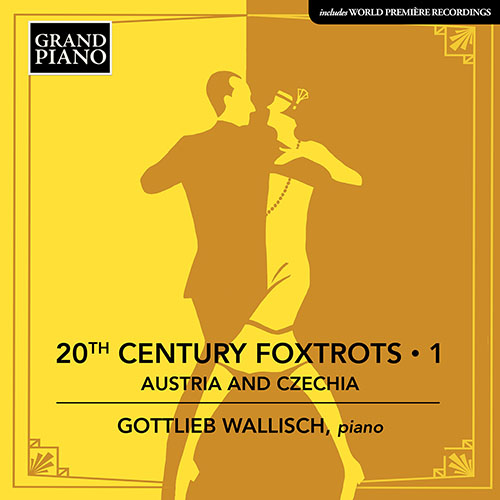
About this Release
“I love to discover forgotten music in libraries and music estates, and was impressed by how many distinguished "classical" composers contributed piano pieces to the Jazz- and Dance-wave of the "Roaring Twenties"! The initial idea was to record a single album with hidden gems, but because there's so much good music, the project has now expanded into a series of several albums. Of particular note are the pieces from Jonny spielt auf by Ernst Krenek and Jaroslav Ježek's Bugatti Step and Echoes of the Music Hall. Jonny was perhaps the biggest opera success of the 1920s, the role-model of the so-called "Zeitgeist-opera", and it's fantastic to revive some of its greatest tunes and hits on the piano. The Ježek pieces are perfect examples of the joie de vivre of that era, pulsating and full of pianistic energy!” — Gottlieb Wallisch
20TH CENTURY FOXTROTS • 1
Austria and Czechia
- Gottlieb Wallisch, piano
During the inter-war period, in the cities of the West, a younger generation found ways to enjoy life in the form of dances such as shimmies, foxtrots, tangos and Charlestons: strong rhythms that became a symbol of a carefree and decadent era. The new jazz craze took hold everywhere, and Krenek’s opera Jonny spielt auf became an overnight sensation. The inter-war Zeitgeist in Vienna and the Czech lands is reflected in a programme full of première recordings—many of which were hits in their day—rich with fashionable dynamism, syncopation and joie de vivre.
This recording was made on: Steinway, Model D, number 544063
Tracklist
|
Krenek, Ernst
|
|
Potpourri aus der Oper Jonny spielt auf (Potpourri from the Opera Jonny Strikes Up) (arr. J. Takács for piano) (1925) (00:36:00 )
|
|
1
Shimmy * (00:01:29)
|
|
2
Blues * (00:02:38)
|
|
3
Tango * (00:01:31)
|
|
4
Der Sprung über den Schatten (The Leap Over the Shadow), Op. 17: Foxtrot (arr. G. Blasser for piano) (1923) * (00:03:17)
|
|
Bittner, Julius
|
|
5
Shimmy auf den Namen Bach (Shimmy on the Name Bach) (1924) * (00:01:58)
|
|
Benatzky, Ralph
|
|
Die Fünf Wünsche (The Five Wishes) (arr. for piano) (1928) (00:09:00 )
|
|
6
Flirt, Slowfox * (00:01:27)
|
|
7
L'Heure bleue, Boston * (00:03:21)
|
|
8
Tango macabre * (00:03:56)
|
|
Mittler, Franz
|
|
9
Foolish Spring, Foxtrot (1934) * (00:03:42)
|
|
Grosz, Wilhelm
|
|
Baby in der Bar, Op. 23 (arr. G. Blasser for piano) (1928) (00:06:00 )
|
|
10
Shimmy * (00:02:51)
|
|
11
Tango * (00:03:19)
|
|
Krauss-Elka, Leopold
|
|
12
Thannhäuser-Foxtrot, Op. 33, "Lied an den morgenstern" (Song to the Morning Star) (1921) * (00:02:11)
|
|
Eisler, Hanns
|
|
13
Shymmy-Tempo (1926) * (00:00:59)
|
|
Petyrek, Felix
|
|
14
Illusion, Foxtrot (1922) * (00:03:24)
|
|
15
Arizona-Foxtrot (1924) * (00:01:54)
|
|
Ježek, Jaroslav
|
|
16
Bugatti-Step () (00:02:58)
|
|
17
Ozvěny z music-hallu (Echoes of the Music Hall), Foxtrot (1936) * (00:01:59)
|
|
Hába, Alois
|
|
4 Moderní tance, Op. 39 () (00:18:00 )
|
|
18
No. 1. Shimmy-Blues (00:02:02)
|
|
19
No. 2. Blues (00:03:14)
|
|
20
No. 3. Boston (00:03:01)
|
|
21
No. 4. Tango (00:02:12)
|
|
Martinů, Bohuslav
|
|
22
Foxtrot, H. 126bis (1920) (00:02:35)
|
|
23
One-step, H. 127bis (1921) * (00:01:26)
|
|
24
Black Bottom, H. 165 (1927) (00:00:53)
|
|
Jirák, Karel Boleslav
|
|
25
The Kingdom of Heaven, Slow Foxtrot (Blues) (1929) * (00:03:30)
|
|
Weinberger, Jaromír
|
|
26
Matěj Poctivý: City Shimmy () * (00:01:52)
|
|
Schulhoff, Erwin
|
|
2 Excerpts from Groteske (1925) (00:06:00 )
|
|
27
No. 1. Valse Boston * (00:03:30)
|
|
28
No. 2. Shimmy-Fox * (00:02:23)
|
The Artist(s)
 Born in Vienna, Gottlieb Wallisch first appeared on the concert platform when he was seven years old, and at the age of twelve made his debut in the Golden Hall of the Vienna Musikverein. A concert directed by Yehudi Menuhin in 1996 launched Wallisch’s international career: accompanied by the Sinfonia Varsovia, the seventeen-year-old pianist performed Beethoven’s ‘Emperor’ Concerto.
Since then Wallisch has received invitations to the world’s most prestigious concert halls and festivals including Carnegie Hall in New York, Wigmore Hall in London, the Cologne Philharmonie, the Tonhalle Zurich, the NCPA in Beijing, the Ruhr Piano Festival, the Beethovenfest in Bonn, the Festivals of Lucerne and Salzburg, December Nights in Moscow, and the Singapore Arts Festival. Conductors with whom he has performed as a soloist include Giuseppe Sinopoli, Sir Neville Marriner, Dennis Russell Davies, Kirill Petrenko, Louis Langrée, Lawrence Foster, Christopher Hogwood, Martin Haselböck and Bruno Weil.
Orchestras he has performed with include the Vienna Philharmonic and Vienna Symphony Orchestras, the Royal Liverpool Philharmonic, the Gustav Mahler Youth Orchestra, the Frankfurt Radio Symphony, the Festival Strings Lucerne, the Franz Liszt Chamber Orchestra in Budapest, the Musica Angelica Baroque Orchestra in Los Angeles, and the Stuttgart Chamber Orchestra.
Born in Vienna, Gottlieb Wallisch first appeared on the concert platform when he was seven years old, and at the age of twelve made his debut in the Golden Hall of the Vienna Musikverein. A concert directed by Yehudi Menuhin in 1996 launched Wallisch’s international career: accompanied by the Sinfonia Varsovia, the seventeen-year-old pianist performed Beethoven’s ‘Emperor’ Concerto.
Since then Wallisch has received invitations to the world’s most prestigious concert halls and festivals including Carnegie Hall in New York, Wigmore Hall in London, the Cologne Philharmonie, the Tonhalle Zurich, the NCPA in Beijing, the Ruhr Piano Festival, the Beethovenfest in Bonn, the Festivals of Lucerne and Salzburg, December Nights in Moscow, and the Singapore Arts Festival. Conductors with whom he has performed as a soloist include Giuseppe Sinopoli, Sir Neville Marriner, Dennis Russell Davies, Kirill Petrenko, Louis Langrée, Lawrence Foster, Christopher Hogwood, Martin Haselböck and Bruno Weil.
Orchestras he has performed with include the Vienna Philharmonic and Vienna Symphony Orchestras, the Royal Liverpool Philharmonic, the Gustav Mahler Youth Orchestra, the Frankfurt Radio Symphony, the Festival Strings Lucerne, the Franz Liszt Chamber Orchestra in Budapest, the Musica Angelica Baroque Orchestra in Los Angeles, and the Stuttgart Chamber Orchestra. The Composer(s)
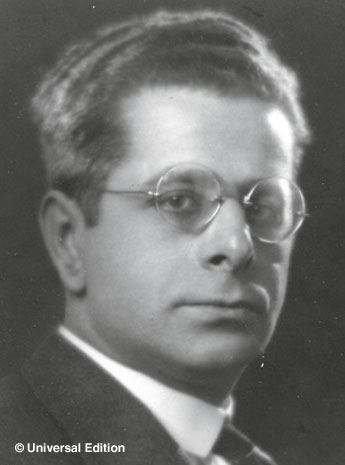 The Viennese composer and pianist, Wilhelm Grosz, was also a renowned conductor, orchestrator and recording director – a musician of remarkable versatility and wide-ranging influences.
The Viennese composer and pianist, Wilhelm Grosz, was also a renowned conductor, orchestrator and recording director – a musician of remarkable versatility and wide-ranging influences. 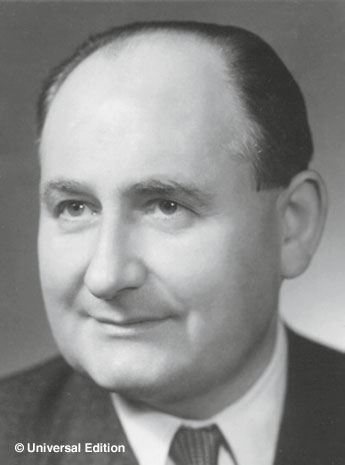 Alois Hába left his mark in modern classical music especially with his harmonic theories and microtonal pieces. A pupil of Reger, as Weinberger and Schulhoff were, he composed also some diatonic works, expressing a neo-Romantic idiom, with hints of the folk music of his native Valašsko region.
Alois Hába left his mark in modern classical music especially with his harmonic theories and microtonal pieces. A pupil of Reger, as Weinberger and Schulhoff were, he composed also some diatonic works, expressing a neo-Romantic idiom, with hints of the folk music of his native Valašsko region. 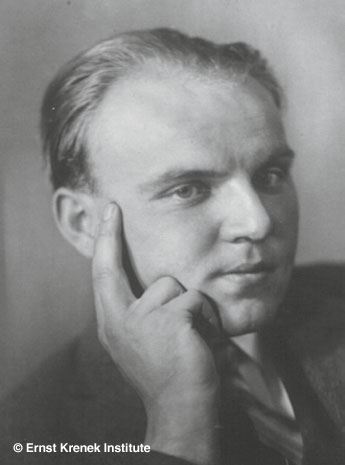 Ernst Krenek’s compositions of the 1920s won him a reputation as an enfant terrible, bringing international success with his jazz opera Jonny spielt auf, and in the 1930s a change to serial composition, notably in the opera Karl V, withdrawn through political intrigue from a planned staging in Vienna in 1934.
Ernst Krenek’s compositions of the 1920s won him a reputation as an enfant terrible, bringing international success with his jazz opera Jonny spielt auf, and in the 1930s a change to serial composition, notably in the opera Karl V, withdrawn through political intrigue from a planned staging in Vienna in 1934. 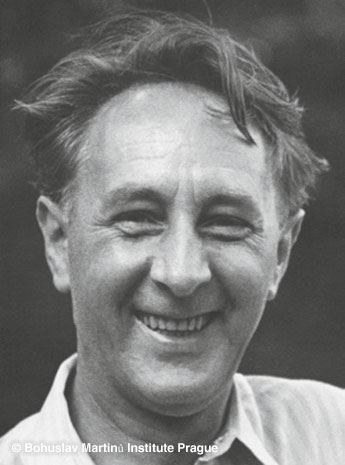 Born in a church tower in the Bohemian country town of Polička, Bohuslav Martinů was a prolific enough composer as a child, before he entered Prague Conservatory as a violin student in 1906. His interest, however, lay in composition. Failing to complete his course at the Conservatory or at the Prague Organ School, to which he had been transferred, he worked as an orchestral player before moving, in 1923, to Paris. The approach of the German armies in 1940 forced him to make his way, as best he could, to the United States, where he was encouraged by commissions from Koussevitzky. Political events in Czechoslovakia prevented his intended return after the war; he spent his final years abroad, dying in Switzerland in 1959.
Born in a church tower in the Bohemian country town of Polička, Bohuslav Martinů was a prolific enough composer as a child, before he entered Prague Conservatory as a violin student in 1906. His interest, however, lay in composition. Failing to complete his course at the Conservatory or at the Prague Organ School, to which he had been transferred, he worked as an orchestral player before moving, in 1923, to Paris. The approach of the German armies in 1940 forced him to make his way, as best he could, to the United States, where he was encouraged by commissions from Koussevitzky. Political events in Czechoslovakia prevented his intended return after the war; he spent his final years abroad, dying in Switzerland in 1959. 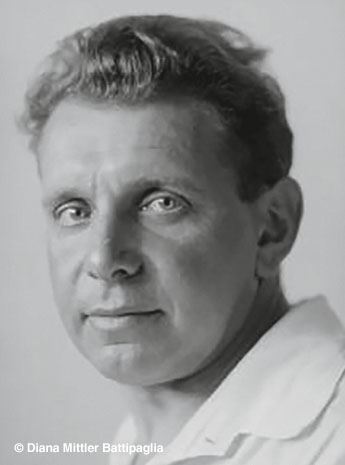 Franz Mittler, equally proficient as an accompanist, was a child prodigy as a composer, and in the 1930s became musical assistant to Karl Kraus.
Franz Mittler, equally proficient as an accompanist, was a child prodigy as a composer, and in the 1930s became musical assistant to Karl Kraus.  Erwin Schulhoff was born in Prague on 8 June 1894 and showed musical ability from an early age. A musical career was decided upon on the recommendation of no less than Antonín Dvorák, and Schulhoff studied at the Prague Conservatory from 1904, followed by piano tuition in Vienna from 1906 then composition in Leipzig with Max Reger from 1908 and subsequently in Cologne with Fritz Steinbach from 1911. In the meantime he had laid the basis of a career as a pianist, while his efforts at composing were rewarded with the Mendelssohn Prize in 1918 for a piano sonata. His music up to the First World War had shown the expected influences from Brahms and Dvorák, and by way of Strauss, to Debussy and Scriabin, but four years in the Austrian army saw him adopt a more radical stance artistically and politically. In the next few years he absorbed the values of the Expressionism represented by Schoenberg and the Second Viennese School as well as the Dadaism espoused by Georg Grosz, whose advocacy of jazz was to find its way into much of Schulhoff’s music from that period.
Erwin Schulhoff was born in Prague on 8 June 1894 and showed musical ability from an early age. A musical career was decided upon on the recommendation of no less than Antonín Dvorák, and Schulhoff studied at the Prague Conservatory from 1904, followed by piano tuition in Vienna from 1906 then composition in Leipzig with Max Reger from 1908 and subsequently in Cologne with Fritz Steinbach from 1911. In the meantime he had laid the basis of a career as a pianist, while his efforts at composing were rewarded with the Mendelssohn Prize in 1918 for a piano sonata. His music up to the First World War had shown the expected influences from Brahms and Dvorák, and by way of Strauss, to Debussy and Scriabin, but four years in the Austrian army saw him adopt a more radical stance artistically and politically. In the next few years he absorbed the values of the Expressionism represented by Schoenberg and the Second Viennese School as well as the Dadaism espoused by Georg Grosz, whose advocacy of jazz was to find its way into much of Schulhoff’s music from that period. 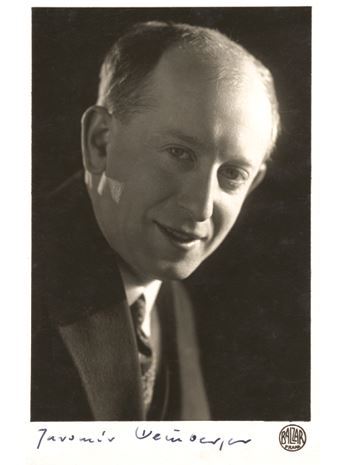 A gifted child, the Bohemian composer Jaromír Weinberger studied at the Prague Conservatory with Vitězslav Novák and then with Max Reger in Leipzig, pursuing an early career as a conductor and pianist. He wrote music in particular for the theatre and, during a period teaching in America, sought to emulate Dvořák in a planned ‘Union Rhapsody’, a purpose never realised. At home he became briefly director of the opera in Bratislava and director of the Cheb Music School before moving to Prague. Compelled to emigrate after the Anschluss, he returned to America in 1939, settling in Florida where his later depression led to suicide.
A gifted child, the Bohemian composer Jaromír Weinberger studied at the Prague Conservatory with Vitězslav Novák and then with Max Reger in Leipzig, pursuing an early career as a conductor and pianist. He wrote music in particular for the theatre and, during a period teaching in America, sought to emulate Dvořák in a planned ‘Union Rhapsody’, a purpose never realised. At home he became briefly director of the opera in Bratislava and director of the Cheb Music School before moving to Prague. Compelled to emigrate after the Anschluss, he returned to America in 1939, settling in Florida where his later depression led to suicide. Reviews
“This new recording is an utterly delightful collection of Austrian and Czech foxtrots and other dance music, performed with panache and great affection.” – American Record Guide
“Gottlieb Wallisch shows himself to be a fine and light-footed pianist who breathes wit and vibrancy without pathos and exaggerations of this music.” – The New Listener
“Not to be missed!” – Stretto
“The whole disc is thoroughly entertaining and uplifting.” – Lark Reviews
“A fun album overall with a few hearty side dishes but also a lot of chocolate éclairs.” – The Art Music Lounge

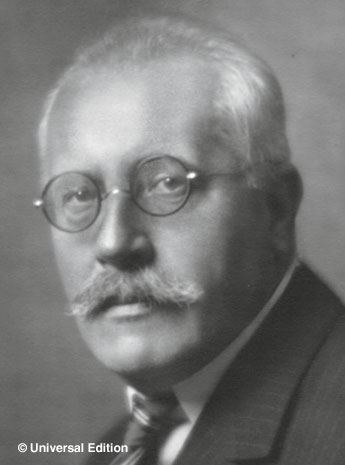
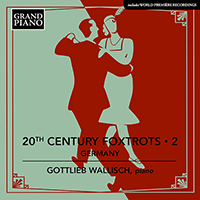
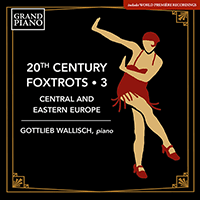
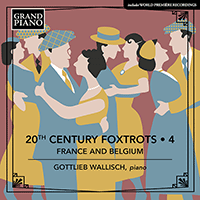
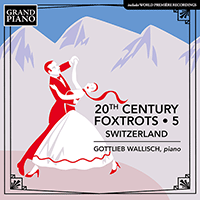
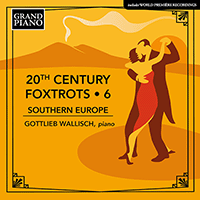
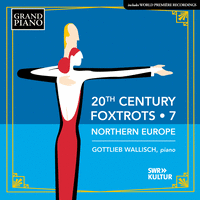
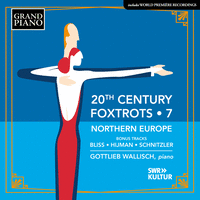
 Grand Piano has gained a reputation for producing high quality recordings of rare keyboard gems. Dedicated to the exploration of undiscovered piano repertoire, the label specialises in complete cycles of piano works by many lesser-known composers, whose output might otherwise have remained unknown and unrecorded.
Grand Piano has gained a reputation for producing high quality recordings of rare keyboard gems. Dedicated to the exploration of undiscovered piano repertoire, the label specialises in complete cycles of piano works by many lesser-known composers, whose output might otherwise have remained unknown and unrecorded.






